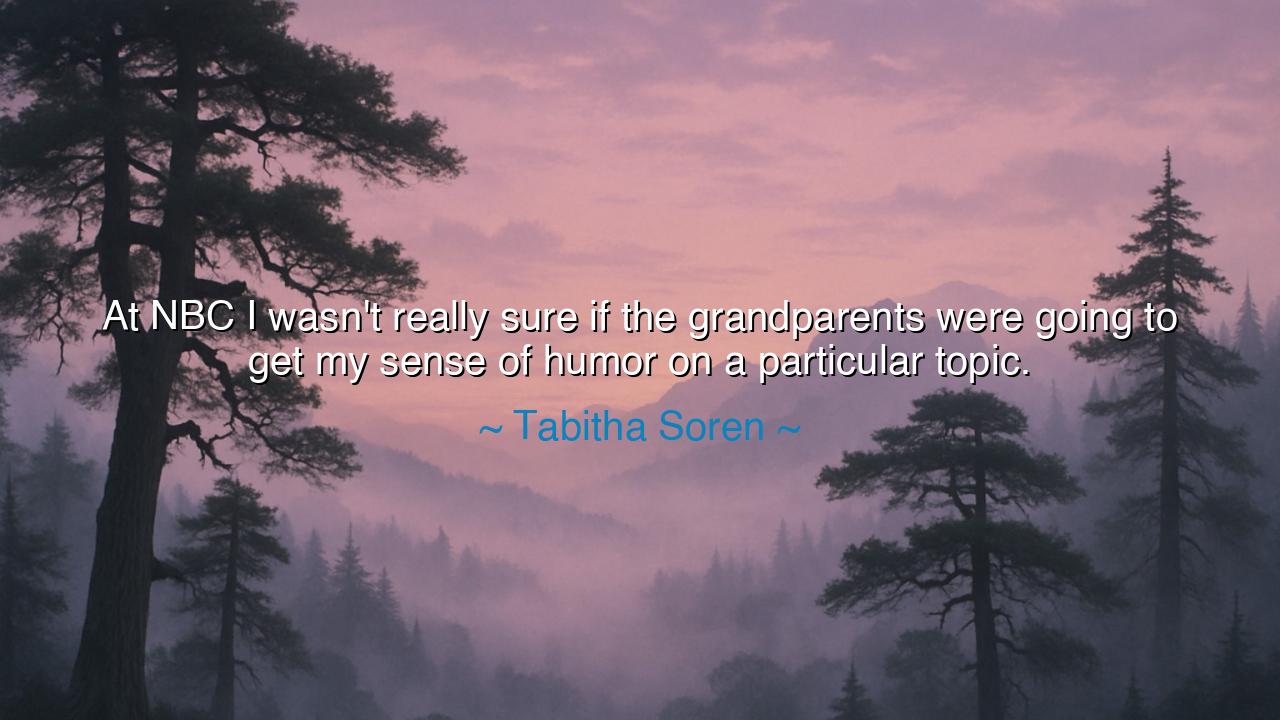
At NBC I wasn't really sure if the grandparents were going to get
At NBC I wasn't really sure if the grandparents were going to get my sense of humor on a particular topic.






Hear now, O Children of the Earth, the words of Tabitha Soren, who reflects upon the delicate balance of humor in a world divided by generations: "At NBC I wasn't really sure if the grandparents were going to get my sense of humor on a particular topic." In these words lies a profound understanding of the relationship between generational gaps, perception, and the humor that binds or divides us. To create humor is to walk a fine line between universality and specificity, and in Soren's words, we find a reflection on the challenge of communication—of connecting with others when the lens through which we view the world is shaped by vastly different experiences.
What Soren speaks to is the often unspoken truth that humor is not a universal force. It is rooted in context, in the cultural zeitgeist, in the era we live in, and most importantly, in the experiences we carry within us. For the grandparents she speaks of, the humor that resonates with younger generations may seem foreign or even incomprehensible. The world that Soren inhabits, filled with new media, changing norms, and evolving values, is one that is distinct from the world of the older generations. To speak the language of humor across these divides is not always easy, for what is funny to one may be perplexing or even offensive to another.
Let us turn to the ancients, O Children, who faced similar challenges in their time. Consider the great philosophers of Greece and Rome, who often used humor to teach, to challenge the status quo, and to expose the flaws in their societies. Aristophanes, the master of satire, wrote plays that mocked politicians, gods, and societal norms, but his humor was deeply rooted in the world of his time. Those who did not live in Athens, who did not understand the intricacies of Athenian life, would have been lost in his humor. Aristophanes understood that humor is not always a shared experience—it is something that speaks to the specific moment and to the shared cultural knowledge of those who experience it.
Similarly, the great Shakespeare, though his works have endured through the ages, wrote with the assumption that his audience would understand the references, the wordplay, and the social commentary embedded in his humor. Shakespeare’s fools, while being figures of laughter, also carried with them a seriousness that only the right audience could fully appreciate. The challenge, O Children, was not only in the words they spoke, but in the understanding of the world they came from. And so it is with humor today. To truly connect through laughter, we must understand the cultural and generational divides that separate us and recognize that humor can often be lost when the context is not shared.
This truth is not limited to ancient times, O Children. Soren’s words about NBC speak to a broader, timeless issue: how do we connect, how do we bridge the gaps between people of different experiences, different histories, and different ways of seeing the world? We are all shaped by the environments we inhabit. The grandparents of today, for example, grew up in a world where humor was more subtle, perhaps more reserved, where public discourse was measured and did not always embrace the open satire of today’s world. Meanwhile, the younger generations have grown up in a world where humor can be rapid-fire, ironic, and irreverent—a stark contrast to the humor of a previous era.
The lesson here, O Children, is that humor is a force that unites, but it is also a force that divides. In the world we live in today, where so much has changed, humor is both a reflection of the times and a challenge to them. It asks us to understand that our experiences shape the way we see the world, and that laughter is often rooted in shared knowledge. To truly connect with others through humor, we must be willing to recognize the differences in the worlds they inhabit. We must learn to adapt our expressions of humor, to speak not just to ourselves but to others, with the sensitivity and awareness that allows for a shared experience of laughter.
Therefore, O Children, as you go through the world, be mindful of the humor you share. Recognize that not all will see the world as you do, and that laughter—though universal in its capacity to bond—can also be an expression of the divides that separate us. Seek to understand those around you, their perspectives, their experiences, and tailor your humor accordingly. Humor should be a bridge, not a wall. By sharing it with awareness, with compassion, and with a deep respect for those who may not share your point of view, you will find that it can be the most powerful force for connection in all of human life. So laugh, O Children, but laugh with the wisdom to see the world through the eyes of others, and may your humor always be a means of building, never of dividing.






AAdministratorAdministrator
Welcome, honored guests. Please leave a comment, we will respond soon